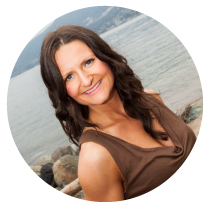By Alicia Putinski
**Trigger Warning: This article discusses fitness and exercise in the context of recovery from an eating disorder. Please practice mindfulness and self-care if these topics are triggering to you.**
To be in our bodies is a beautiful feeling. Experiencing the multiple layers of ourselves using the information our bodies provide is a wonderful way to form a deeper connection to ourselves and the world around us. I truly believe health is a mind-body connection and as we feel into the ways our bodies communicate with us, we are able to make choices that honour our unique needs. This experience is called the feeling of "embodiment."
I am an orthorexia-recovered life coach and holistic personal trainer. Like many in the health and fitness industry, I developed the “clean eating” eating disorder. I was so obsessed with clean eating that it became unhealthy and self-punishing. Although there are many triggers in the health and fitness industry, I will always stress that eating disorders are not about food at the root, and addressing the whole person is crucial in recovery.
One of the most valuable lessons I learned healing from my eating disorder and body dysmorphia was how to become embodied.
Embodiment is the representation or expression of something in a tangible or visible form. I feel it a nd embrace it as the freedom to be in my body, feeling into my body, listening to it, and replying with self-care — whether this be having an exciting spontaneous day and living in the moment, or having a challenging day, taking a time out, and showing myself compassion. We can feel embodied through movement or in stillness. Our mind-body connection is fascinating and a wise communicator. Embodiment allows us to receive signals from our body on a physical and emotional level, and make choices that will best honour our needs.
nd embrace it as the freedom to be in my body, feeling into my body, listening to it, and replying with self-care — whether this be having an exciting spontaneous day and living in the moment, or having a challenging day, taking a time out, and showing myself compassion. We can feel embodied through movement or in stillness. Our mind-body connection is fascinating and a wise communicator. Embodiment allows us to receive signals from our body on a physical and emotional level, and make choices that will best honour our needs.
Becoming embodied in general is a process that takes practice, so be kind to yourself along the way. If you’re hoping to integrate a healthy movement or fitness practice into your recovery, I have some recommendations to help you get started:
- Define your interpersonal fitness goals. Consider your mental and emotional wellbeing. Ask yourself what you want to gain on the inside through exercise. How do you want to feel? Which feelings and emotions are you hoping to cultivate and strengthen by moving your body? Before doing this, please note that emotions are feelings but not all feelings are emotions. For example, happiness is both an emotion and a feeling, whereas accomplishment is a feeling that may bring forth the emotion happiness.
- Focus on health instead of image. It’s no secret that fitness can be very image-focused. Image also appears to be all-encompassing when we observe some of the influencers who are on social media. One thing I suggest my clients do is focus on health instead of image, and define what health means to them on a holistic level. Health looks and feels different to everyone and it can be challenging for those falling into the comparison trap on social media. We can define our own values and intentions while developing a balanced relationship with our body movement routines. After all, fitness is meant to complement our lives, not consume them.
- Exercise in a way that you enjoy, and feel into your limits. Whenever I’m asked how many days per week a person should exercise, I ask them what is realistic for their lifestyle. If you're just starting out, it’s also helpful to start with less and work up to more if it feels good. I advocate the value of rest days and simplistic functional activities, such as walking, as part of an active lifestyle. As a certified Functional Movement Systems Coach, I feel it is so important to prioritize moving well regardless of which activities you choose. Understanding my clients' movement restrictions allows me to know which exercises will help them, as well as which exercises to avoid. Whether you’re working with an exercise coach or not, really try to feel into your body’s signals. If something causes you pain, trust your body and avoid that movement or style of exercise. I believe it is best to see a physiotherapist when your body is providing pain signals during exercise. If you are working with a fitness professional one-on-one or in a group setting, always remember that it’s more than okay to inform them when something doesn’t feel good. There’s a big difference between reasonably challenging ourselves and feeling pain. Pain is a sign from the body asking us to stop.
- Listen to your emotions and the feelings they create in your body. Challenging emotions are trying to tell us valuable information. If you’re having a high stress day and your nervous system is jacked up, it might be a good idea to choose a rest day, or to just engage in gentle movement, instead of committing to a higher-intensity style. At certain times, we benefit much more from calming ourselves than participating in higher energy activities. On the other hand, maybe you’re feeling frustrated about something and your intuition tells you that moving your body will help you release some of that energy in a positive way. The important thing is to always be mindful of how you deal with challenging feelings and emotions on a holistic level. I feel the popularized term “the gym is my therapy” is highly misguided, as this can distract us from doing our inner self-work and also push us to work our bodies too hard. The more in tune we become with our bodies on an emotional level, the more we can understand our emotional signals and how to involve movement in the equation.
- Acknowledge where your mind is at when you move your body. Do you fixate on things such as monitoring your speed or how much you’re sweating? Do you hold a “have to” type of feeling about what you’re doing? Or are you there feeling grateful to be moving your body in a way that feels good? Feeling connected to movement will bring us so much joy as opposed to going through the motions while our minds are preoccupied. Focus on feeling grateful for what your body can do and what you enjoy about the process.
- Kindly dismiss nutritional fads and tune into your own food preferences. Eating to fuel yourself well for your activity, consuming foods you enjoy, having plenty of healthy foods and enjoying treats, and being flexible is my philosophy. We see a lot of trends these days, but balance and sustainability will never go out of style. I believe in having a loving connection with our nourishment no matter what type of food it is. I believe that there are no “good” or “bad” foods and our bodies give us signals when a food isn’t the best fit for us. This includes typical “healthy” foods too! If a certain food doesn't feel good in your body, whether it is kale or cake, there are always other choices available. I also feel that intuitively, it’s important to listen deeply to our cravings in order to honour what our bodies are really asking for.
Progress takes time, both in healing and physical fitness. There have been many times in my own journey of recovering from an eating disorder, as well as beyond recovery, where I dialed down my exercise in order to prioritize other areas of my health. It’s more than okay to change focus and priorities. Bodies change at different phases of our lives and so do our physical abilities. As a life coach, I specialize in helping athletes and fitness enthusiasts make peace with food and their bodies. In this process, we spend a lot of time removing the identity they’ve created in fitness. Fitness can be a lot of fun when it’s executed from a place of self-love. However, it is simply one area of our lives and there is so much more to us as human beings than fitness!
Photo by Robert Collins on Unsplash
 Alicia Putinski is an orthorexia-recovered life coach and the founder of Weightless Body Confidence Coaching. She is also a personal trainer specializing in strength and functional movement. To learn more about her work, visit youareweightless.com
Alicia Putinski is an orthorexia-recovered life coach and the founder of Weightless Body Confidence Coaching. She is also a personal trainer specializing in strength and functional movement. To learn more about her work, visit youareweightless.com
 nd embrace it as the freedom to be in my body, feeling into my body, listening to it, and replying with self-care — whether this be having an exciting spontaneous day and living in the moment, or having a challenging day, taking a time out, and showing myself compassion. We can feel embodied through movement or in stillness. Our mind-body connection is fascinating and a wise communicator. Embodiment allows us to receive signals from our body on a physical and emotional level, and make choices that will best honour our needs.
nd embrace it as the freedom to be in my body, feeling into my body, listening to it, and replying with self-care — whether this be having an exciting spontaneous day and living in the moment, or having a challenging day, taking a time out, and showing myself compassion. We can feel embodied through movement or in stillness. Our mind-body connection is fascinating and a wise communicator. Embodiment allows us to receive signals from our body on a physical and emotional level, and make choices that will best honour our needs. Alicia Putinski is an orthorexia-recovered life coach and the founder of Weightless Body Confidence Coaching. She is also a personal trainer specializing in strength and functional movement. To learn more about her work, visit youareweightless.com
Alicia Putinski is an orthorexia-recovered life coach and the founder of Weightless Body Confidence Coaching. She is also a personal trainer specializing in strength and functional movement. To learn more about her work, visit youareweightless.com